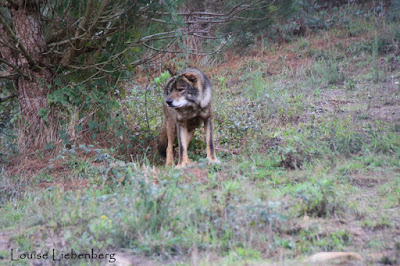Last month I had the honor and privileged to be invited to Portugal to participate in a meeting
"Livestock Production in Wolf Country:Exchanging best practices for preventing damage and improving production".
Participants came from Portugal, Spain, Italy, Switzerland and Canada (me). This was an amazing experience and a great learning opportunity for me. Certainly, an experience I will not forget.
I have so many stories to share, so will spread it out over various blog posts to ensure I have it all covered.
So, this may read a bit as a travel guide, as I will cover day by day what we did.
I will get down to the nitty gritty further in my blogs.
So, to start at the beginning, I arrived in Lisbon and met with Silvia. We spent the afternoon and evening in Lisbon looking at some of the fantastic old buildings and tasting some delectable sweet pastry pies. A great meal at a quaint fish restaurant and a nice walk, rounded out the first day.
After doing a few errands, we headed to our accommodation for the first night at the Iberian Wolf Recovery Center.

"Livestock Production in Wolf Country:Exchanging best practices for preventing damage and improving production".
Participants came from Portugal, Spain, Italy, Switzerland and Canada (me). This was an amazing experience and a great learning opportunity for me. Certainly, an experience I will not forget.
I have so many stories to share, so will spread it out over various blog posts to ensure I have it all covered.
So, this may read a bit as a travel guide, as I will cover day by day what we did.
I will get down to the nitty gritty further in my blogs.
So, to start at the beginning, I arrived in Lisbon and met with Silvia. We spent the afternoon and evening in Lisbon looking at some of the fantastic old buildings and tasting some delectable sweet pastry pies. A great meal at a quaint fish restaurant and a nice walk, rounded out the first day.
After doing a few errands, we headed to our accommodation for the first night at the Iberian Wolf Recovery Center.

This center is home to a number of wolves who cannot live in the wild. The wolves live in 17ha (about 37 acres) enclosures that are nestled in a steep, wooded valley.
The center provides excellent care for these wolves and additionally the center conducts various scientific studies regarding wolf behaviour. The public have the opportunity to get a glimpse of the Iberian wolf and an opportunity to learn more about these animals at this center.
The Iberian wolf has full protection status in Portugal. The wolf numbers are estimated between 200-300. The Iberian wolf is a bit smaller in stature than its Canadian cousin. It has a very typical white lining around its muzzle.
As these wolves live in semi wild state, in a natural habitat setting, it is not always possible to see them.


There is nothing nicer than been woken up at 4 am to the sound of howling wolves.
That certainly made my day!
As the only visitors at the center that morning, we went for a walk and were fortunate enough to see a number of the center's wolves.
That certainly made my day!
As the only visitors at the center that morning, we went for a walk and were fortunate enough to see a number of the center's wolves.
Sometimes, you have to wonder who is checking out who..
The Iberian wolf is responsible for a lot of damage to the livestock and livelihood of the shepherds and livestock keepers in Portugal.
Seeing these wolves, definitely gave me a better understanding of what the shepherds are dealing with. A wolf biologist and cattle rancher, both mentioned to me that they felt the Iberian wolf was perhaps more aggressive that its Canadian counterpart.
This could be in part, from habituation to people, due to the close proximity in which the wolves live to the people.
All, interesting points to ponder on. and would be great to go and visit with the shepherds to see what their attitudes are regarding the wolf.









Thanks so much for sharing details of your trip. I look forward to reading more. I'm interested to learn how wolf-livestock issues are handled in these other countries.
ReplyDelete